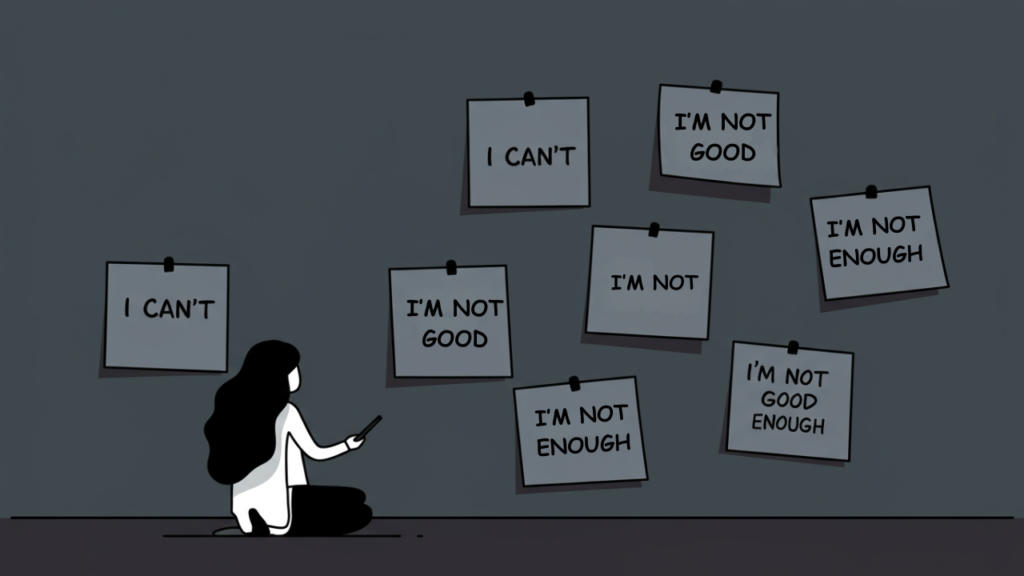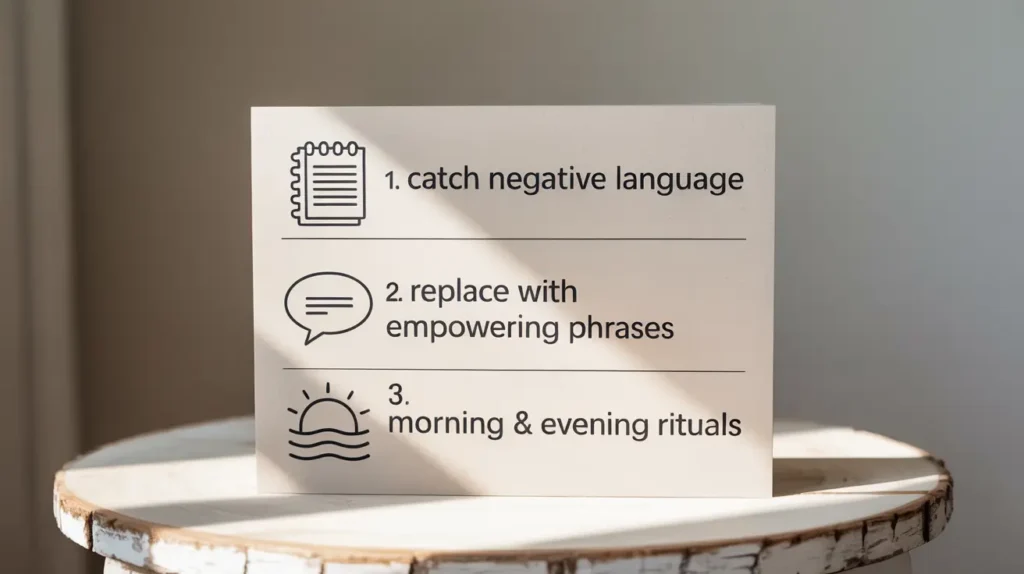Your words are more powerful than you realize. The way you practice self-talk and talk to yourself each day is either moving you closer to success or quietly pushing you toward failure. Simple phrases like “I’m not good at this” or “I’ll never have enough time” may seem harmless but over time, they shape how your brain thinks, what you notice, and how you act.
This happens because of the Reticular Activating System (RAS), the brain’s filter that decides what deserves your attention. When you repeat negative words, your RAS looks for proof to confirm them, keeping you stuck in a cycle of self-doubt. On the other hand, positive self-talk trains your brain to see possibilities, solutions, and opportunities you might otherwise miss.
The truth is, success isn’t just about talent or luck. It starts with the language you use daily. By shifting from limiting phrases to positive, action-driven words, you can reprogram your subconscious mind, boost confidence, and create lasting change.
What Is Self-Programming for Failure?
Self-programming for failure happens when you repeat negative words or phrases until they become your truth. It’s like installing faulty software in your brain.
For example:
- Saying “I’m just not good at this” wires your brain for doubt.
- Repeating “I’ll never succeed” lowers your confidence.
- Phrases like “That’s just how I am” lock you into a fixed mindset.
Over time, these phrases kill productivity and trap you in limiting beliefs, often without you even noticing.
Common Negative Self-Talk Phrases to Avoid

Some everyday phrases silently sabotage your growth:
- “I can’t do this” blocks effort before you even try.
- “I’m not good enough” damages your identity.
- “I always fail” reinforces a failure loop.
- “That’s just how I am” prevents change.
The more you say them, the deeper they dig into your subconscious.
Positive Self-Talk That Builds Success

You can reprogram your brain by reframing limiting words into empowering ones.
- “I can’t do this.” to “I’ll figure it out.”
- “I always fail.” to “I’m learning and improving.”
- “That’s just how I am” to “I’m capable of change.”
These small shifts train your brain to expect growth and build resilience. Positive affirmations aren’t about ignoring reality; they’re about speaking words that align with the identity you want to create.
How Words Shape Your Identity and Habits
Words don’t just affect your thoughts; they shape your identity. The most powerful phrases often begin with “I am.”
- Saying “I am confident” programs your subconscious to act confidently.
- Saying “I am disciplined” reinforces self-control and consistency.
Repeated daily, these identity statements evolve into habits, and habits create results.
The Reticular Activating System: Your Brain’s Filter

Inside your brain, the Reticular Activating System (RAS) acts as a spotlight. It filters what matters based on the words and beliefs you repeat.
- Say “I’m unlucky,” and your RAS finds evidence of bad breaks.
- Say “Opportunities are everywhere,” and your RAS spots possibilities.
Your language literally programs what your brain notices, which means your words decide what opportunities you see (or miss).
Time, Excuses and the Language of Success
We all get 24 hours a day. The difference between success and failure often lies in how you talk about time.
- “I don’t have time” gives away control.
- “It’s not a priority” forces clarity and accountability.
Similarly, “I’ll start tomorrow” creates procrastination loops, while “I’ll take one small step today” builds momentum.
Successful people don’t magically have more hours; they use empowering language to direct focus and energy.
Practical Steps to Change Your Self-Talk

Changing your self-talk is a daily practice of awareness and intentional language. Here’s how to start:
Catch Negative Language
Pay attention to thoughts like “I can’t” or “I always mess this up.” Write them down in a journal to increase awareness.
Replace with Empowering Phrases
Swap limiting words for growth-focused alternatives:
- “I can’t do this.” to “I’ll learn how.”
- “I’m not good enough,” to “I’m improving every day.”
Morning and Evening Rituals
- Morning: Say 3 affirmations such as “I’m ready to succeed” or “Today I’ll make progress.”
- Evening: Reflect with “I gave my best today” or “I’m becoming stronger each day.”
These rituals bookend your day with intentional, empowering language.
Key Takeaways
- Words shape your mindset and identity. Negative self-talk wires your brain for failure, while empowering words build confidence.
- The Reticular Activating System (RAS) filters reality based on your language, your words, programs your brain.
- Replacing limiting phrases with positive ones creates growth-focused habits.
- Excuses like “I don’t have time” keep you stuck; reframing them gives you control.
- Daily rituals of affirmations and reflection reprogram your subconscious for lasting success.
Conclusion: Speak Your Way Into a New Life
Your words aren’t just sounds, they’re commands to your brain and instructions to your future. Negative self-talk keeps you stuck, but positive, empowering language unlocks growth, confidence, and success.
Your reticular activating system listens to everything you say. Feed it with powerful words, and it will find proof to support them. Every “I am” statement plants a seed in your subconscious. Water it daily, and it will grow into the mindset and habits you want.
The next time you catch yourself saying “I can’t,” pause and choose a better phrase. The story you tell yourself today becomes the life you live tomorrow.
FAQs
How do words affect my mindset?
Your words program your brain. Positive self-talk builds confidence and resilience, while negative language reinforces fear and doubt.
What is the Reticular Activating System (RAS)?
The RAS is your brain’s filter. It focuses on what you tell it to. Negative words make it notice obstacles, while positive language makes it spot opportunities.
How can I stop negative self-talk?
Start by becoming aware of your inner dialogue. Replace phrases like “I can’t” with growth statements like “I’ll figure it out.”
Can changing my words really change my habits?
Yes. Words shape identity, and identity drives behavior. Consistent positive self-talk rewires your brain and influences daily actions.
What’s an easy routine to practice positive self-talk?
Start your morning with 3 affirmations, and end your day with a reflection on progress. Over time, these rituals create a success-oriented mindset.





